What To Consider Before Attracting Crows As Pest Control In Your Yard
Crows are beneficial birds to have around the neighborhood for many reasons. Not only will they bring you shiny trinkets like buttons and earrings if you become friends, but they're also an eco-friendly way to keep bugs out of your garden. A murder of crows can eat up to 40,000 pests in one season, eliminating annoying bugs like grubs, armyworms, wasps, and moths from your backyard. This can seem like an easy solution to your problem, one that doesn't require you to use chemical-laden pesticides that can harm any fruits or vegetables you may be growing. However, there is one thing to consider before hiring crows for pest control, and that's whether or not your yard attracts hummingbirds. That's because, along with grubs and beetles, crows also eat hummingbirds.
If you have a hummingbird feeder or have planted flowers especially known to attract small hummers, then it will be counterproductive to attract crows to your yard. Doing so will create a stressful and dangerous situation for the small, winged animals, which can then lead them to permanently avoid your property. However, that's not to say the crows will choose the hummers over the pests. It just increases the small birds' exposure to danger. Here is a closer look at the issue.
Crows are known to occassionally eat hummingbirds
Crows have a very diverse diet. They're known to munch on anything from corn to pecans to watermelon to turtles. Because of this, hummingbirds are also a plausible snack in their eyes and can end up on their menu. However, that doesn't mean the crow will eat the first hummingbird that dares to come into your yard. In fact, hummingbird bones are only found in a small percentage of autopsied crows, which indicates the birds are not their first choice for a meal. Instead, they usually go for hummingbird eggs over the adult birds, but the fact still remains that the small hummers will be vulnerable prey if you invite crows into your yard.
While hummingbirds aren't their first choice, amateur birdwatchers have seen crows attacking these small birds at hummingbird feeders. Because of this, if you would rather not see them hurt or hunted, it's best to find another way to reduce your pest population. If you already attracted them and want to find a way to keep crows out of your yard, there are some precautions you can take. You can hang a stuffed bird that looks like a dead crow next to the feeder, which will keep them away. They also tend to avoid reflective tape, so you can hang that around the feeder. You can also play a recording of upset crow calls to show them it's not a safe area.
Other birds crows endanger
Crows eat both eggs and fully grown birds alike since they're quick sources of protein. For eggs, they will raid the nests of American robins, Savannah sparrows, pinyon jays, and common loons among others. In fact, they're not very picky about eggs, and will likely eat anything available, including gull or heron eggs. So if you notice birds nesting in your yard, it's best not to attract crows to the vicinity. They will also eat fledglings out of the nest, so the small birds are not safe just because they hatched out of their eggs.
For fully-fledged birds, crows have a particular taste for European starlings and house sparrows because they're small and easy to attack. Both of these species are non-native and invasive in the U.S., so perhaps the crows are doing the ecosystem a favor. However, crows are not overly fussy about the species and will go after anything that is vulnerable and easy prey. That said, they will not go out of their way to hunt other birds and will only do so if they are readily available and will be an easy catch. So while your visiting songbirds aren't necessarily in mortal danger if you have crows in your yard, they're less safe than they would be without a group of them nearby.


